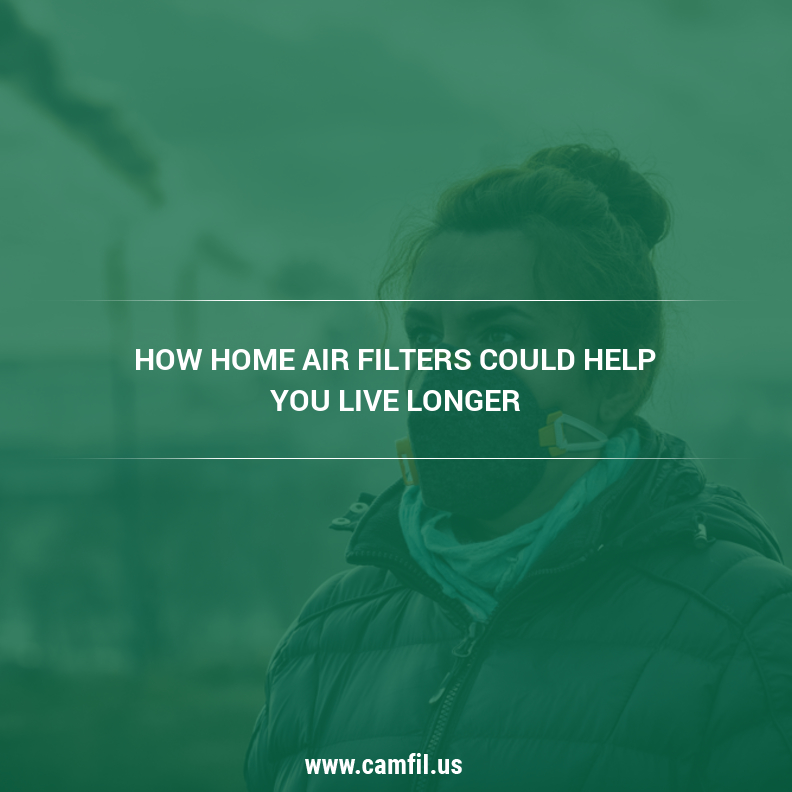A recent study suggests that poor outdoor and indoor air quality can shave off as many as 1.8 years from the average lifespan. Learn how home air filters help.
In recent years, environmental pollution has emerged as a leading cause of premature death, responsible for nearly one in six fatalities, or an estimated 9 million cases worldwide each year. Air pollution alone accounted for 6.5 million deaths in 2015, underscoring just how important home air filters are today.
But the task of identifying air pollution as a causal factor in premature deaths may not account for the number of indirect fatalities it causes. According to one study on air pollution, the tiny toxic particles and chemical gases that make up polluted air contribute to a higher risk of lung disease, heart disease and strokes, shaving off four months from the average American’s lifespan and as many as 1.8 years from someone living in parts of Asia and Africa.
Impact of Poor Outdoor and Indoor Air Quality on Mortality
To understand the impact of poor outdoor and indoor air quality on human lifespans, the researchers obtained data from the Global Burden of Disease 2016 dataset, which contains an extensive collection of diseases, injuries, and other issues that kill people around the world each year.
The research team focused specifically on fine particulate matter, or PM2.5—pollution particles no larger than 2.5 microns in diameter, or about 30 times smaller than the width of a human hair.
“Long term exposure to ultrafine particles can induce respiratory and cardiovascular diseases,” explains Camfil USA’s Charlie Seyffer, Manager of Marketing & Technical Materials for commercial air filters and 37-year ASHRAE member and active committee participant. “Below PM2.5, particles are more harmful because they penetrate deeper into the lung alveoli. They cross blood vessels walls, diffuse into the blood circulation to reach and affect organ function.”
It’s for this reason that consistent exposure to airborne pollutants is associated with an increased incidence of heart attacks, strokes and lung diseases.
Home Air Purifiers Offer Solution to Cut Down Airborne PM Levels
The study, led by Joshua Apte of the Cockrell School of Engineering at the University of Texas at Austin, analyzed PM2.5 exposure levels across 185 countries, cross-referencing this with local life expectancy levels. According to Apte, while saying that 90,000 Americans die each year from air pollution is alarming, framing the numbers in terms of life expectancy may leave a more relatable impression on people. The good news is that high-quality home air purifiers are more than capable of capturing and removing particulate matter from indoor environments, provided that the air purifier is the appropriate type for the size of the room.
Why Home Air Purification Systems Are Especially Needed in Developing World
Home air purification systems are especially important in developing parts of the world as the study reveals that the impacts of air pollution vary according to how “dirty” the air is for a population. For example, in the United States, PM2.5 robs Americans of approximately four months off their average lifespan. On the other hand, in Bangladesh and Egypt, where air pollution levels are significantly higher, poor air quality is shaving off more than 1.8 years from people’s lifespans.
Overall, the study shows that 42 countries saw drops in life expectancy by at least a year due to high levels of particulate matter in the atmosphere.
Silver Lining in Study Shows Opportunity for Home Air Filtration Systems to Help
But the study also presents a positive finding. The researchers calculated how many years people could add to their lifespan if the countries they lived in succeeded in limiting their air pollution exposure to PM2.5—the standard deemed by the World Health Organization’s air quality guidelines as “acceptable.” They found that doing so would give back the average Egyptian 1.3 years of life, for example. What this also means is that technologies such as home air filtration systems can be used to ensure that air quality inside homes and buildings remains high even in areas with high air pollution levels.
Commercial High Efficiency Air Filtration Systems Also Maintain Comfort and Quality of Life
Over the last 100 years, global human lifespans have almost doubled thanks to better access to food, modern medicine, and other improvements. Today, most people can expect to live to 70 and beyond. And while much of the focus on air pollution is on the number of deaths linked to it, experts have also cautioned the public to remember that poor outdoor and indoor air quality also affects their quality of life. In other words, air quality solutions such as commercial high efficiency air filtration systems don’t just help extend lifespans, they also ensure that people are healthy and comfortable.
For instance, for air purifiers that use true HEPA filters rated to capture and remove 99.97 percent of particulate matter down to 0.3 microns in diameter, they also prevent natural airborne pollutants like dust, pollen and mold from circulating inside homes and buildings. And as anyone who routinely suffers from allergy season during the spring and summer months knows, having an air filter can make a world of difference when it comes to comfort.
Learn more about protecting your home using home air filters by getting in touch with Camfil USA. Talk to our team to learn about our systems designed to protect your indoor air quality against air pollution or browse our product catalog to learn more about our air filters.
Media Contact:
Lynne Laake
Camfil USA Air Filters
T: 888.599.6620
E: Lynne.Laake@camfil.com
F: Friend Camfil USA on Facebook
T: Follow Camfil USA on Twitter
Y: Watch Camfil Videos on YouTube
The post How Home Air Filters Could Help You Live Longer appeared first on Air Filters for Clean Air.

